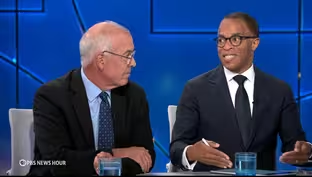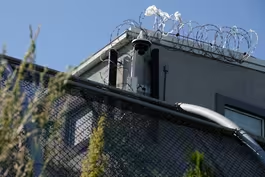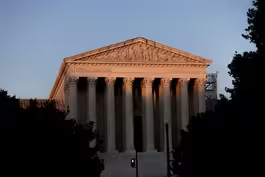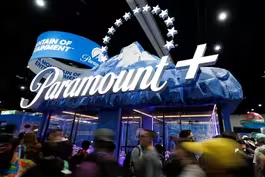
What Trump's order on forced treatment means for unhoused
Clip: 7/25/2025 | 5m 53sVideo has Closed Captions
What Trump's order on clearing encampments, forced hospitalization means for the unhoused
President Trump signed an executive order that makes it easier for states to remove homeless encampments and force unhoused people into mental health or addiction treatment programs. Homeless rates have been steadily rising since 2017. A federal count found that more than 770,000 people are living in shelters or outside on a single night. Lisa Desjardins discussed more with David Ovalle.
Problems playing video? | Closed Captioning Feedback
Problems playing video? | Closed Captioning Feedback
Major corporate funding for the PBS News Hour is provided by BDO, BNSF, Consumer Cellular, American Cruise Lines, and Raymond James. Funding for the PBS NewsHour Weekend is provided by...

What Trump's order on forced treatment means for unhoused
Clip: 7/25/2025 | 5m 53sVideo has Closed Captions
President Trump signed an executive order that makes it easier for states to remove homeless encampments and force unhoused people into mental health or addiction treatment programs. Homeless rates have been steadily rising since 2017. A federal count found that more than 770,000 people are living in shelters or outside on a single night. Lisa Desjardins discussed more with David Ovalle.
Problems playing video? | Closed Captioning Feedback
How to Watch PBS News Hour
PBS News Hour is available to stream on pbs.org and the free PBS App, available on iPhone, Apple TV, Android TV, Android smartphones, Amazon Fire TV, Amazon Fire Tablet, Roku, Samsung Smart TV, and Vizio.
Providing Support for PBS.org
Learn Moreabout PBS online sponsorshipGEOFF BENNETT: President Trump signed an executive order that makes it easier for states to remove homeless encampments and force homeless people into mental health or addiction treatment programs.
Our Lisa Desjardins explains.
LISA DESJARDINS: President Trump's order lays out his goal clearly.
He wants to move more people who are homeless into long-term institutions and hospitals, including involuntarily.
He also plans a dramatic shift in federal funds, away from programs that place people into housing first and instead pushing for tougher, immediate requirements for treatment.
Homeless rates have been steadily rising since 2017.
A federal count found that more than 770,000 people were living in shelters or outside on a single night last year.
For more on this latest executive action and what it may mean, I'm joined by David Ovalle, national reporter focusing on opioids and addictions for The Washington Post.
There is a great deal in this order, David.
First, does President Trump have the power to either encourage or tell states that they need to put more people in institutions, even involuntarily?
DAVID OVALLE, The Washington Post: Well, no, not specifically.
And that's one of the interesting things about this order is that he's really -- they're really trying to incentivize and push states into doing this.
Remember, states set the -- their particular laws.
They set their criteria for how they handle involuntary commitments.
So, really, this is a state issue, but the federal government certainly has a lot of sway.
And they can -- for example, in the executive order, they talk about prioritizing grants for states that -- or jurisdictions that comply with this order and crack down on open air drug use and other things to combat - - quote, unquote -- "vagrancy" on the streets.
So, certainly, there are sort of incentives they can do to kind of push states to doing this.
And, certainly, Trump has a lot of sway, particularly among red states.
So if states feel like they're going to benefit by implementing a more robust involuntary commitment program, then they just might.
LISA DESJARDINS: What does President Trump say he is trying to do here?
And how does that mesh with what we know about substance abuse and mental illness in this population in particular?
DAVID OVALLE: Well, I think Trump's message is something that does resonate with a lot of people, particularly as we have seen in cities where there are people camped out on sidewalks, where there are people who are clearly grappling with mental illness in a very visible,public way.
And so, whether you're seeing it firsthand or you're watching it on TV, certainly, this is something that concerns people, right?
But, of course, in a very Trump way, it's also sort of loaded with very fear-inducing language, right?
It's vagrancy.
It's people are having violent confrontations on the street.
And when you talk to advocates for the homeless, advocates for people with mental -- who are dealing with mental illness, they point out that most people that are dealing with mental illness are not getting arrested.
They're not violently lashing out at people.
But it's when these things happen in a very high-profile way, like we have seen happen in New York City, for example,they tend to grab a lot of headlines.
So these are real fears that manifest themselves in our cities, but it kind of gets really amped up by some of the rhetoric.
LISA DESJARDINS: Where are the advocates on the tension here?
Obviously, there's a public concern.
You talked about that.
But what are their concerns about this idea of stepped-up involuntarily moving people into hospitals?
DAVID OVALLE: Well, I think the overarching fear is that we might return to decades -- to policies of decades past, where people were unjustly and unfairly being held in asylums for months and years against their will and not really getting the right kind of treatment or maybe they weren't supposed to be there in the first place.
So that's sort of the overarching fear.
But I think the fact that there's -- it's -- there's a lot of public health dollars that are being cut right now.
And so some of that money, they say, should be better spent on helping people in treatment and not just locking them away sort of indefinitely.
LISA DESJARDINS: You know, I spoke to a man who's almost 80 who's experiencing homelessness now, has for a long time.
He is one of those roughly one-third in that population.
He's also dealt with serious mental illness, as we're talking about.
And he said he just does not think there's room in the system, in the hospitals, in shelters for these kinds of populations.
What do we know about that?
DAVID OVALLE: Right.
Well, there is limited bed space.
And, in Florida, where I'm normally based, you see there's been a lot of forensic hospitals that have closed because there has been this push in recent decades to get people out into the community and to get them getting treatment out in the community, and not in a locked-up facility.
So there really is not a lot of bed space.
And with budgets being strapped the way that they are these days, particularly with cuts coming from D.C., it's going to -- states and communities are going to be hard-pressed to really build those facilities and be able to meet the needs of the people that are looking to be -- that people want to put away.
LISA DESJARDINS: David Ovalle, thank you for your reporting on complex issues.
We really appreciate you talking with us today.
DAVID OVALLE: Thank you.
Brooks and Capehart on the Epstein files and Trump's base
Video has Closed Captions
Clip: 7/25/2025 | 13m 37s | Brooks and Capehart on the Epstein files fracturing Trump's base (13m 37s)
How private companies could cash in on Trump's deportations
Video has Closed Captions
Clip: 7/25/2025 | 5m 48s | How private companies could cash in on Trump's mass deportations (5m 48s)
Kagan criticizes justices over lack of explanation
Video has Closed Captions
Clip: 7/25/2025 | 6m 46s | Kagan criticizes fellow justices over lack of explanation in recent Supreme Court rulings (6m 46s)
News Wrap: Israel considering alternatives to Gaza ceasefire
Video has Closed Captions
Clip: 7/25/2025 | 4m 53s | News Wrap: Israel considering 'alternative options' to ceasefire with Hamas (4m 53s)
The politics behind the $8B Paramount-Skydance merger
Video has Closed Captions
Clip: 7/25/2025 | 7m 34s | The politics behind the $8B Paramount-Skydance merger (7m 34s)
Ruth Asawa exhibit celebrates her influential art and life
Video has Closed Captions
Clip: 7/25/2025 | 7m 42s | Ruth Asawa exhibition celebrates her influential art and extraordinary life (7m 42s)
Providing Support for PBS.org
Learn Moreabout PBS online sponsorshipSupport for PBS provided by:
Major corporate funding for the PBS News Hour is provided by BDO, BNSF, Consumer Cellular, American Cruise Lines, and Raymond James. Funding for the PBS NewsHour Weekend is provided by...

















